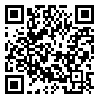Volume 35, Issue 140 (March 2023)
IJN 2023, 35(140): 630-641 |
Back to browse issues page
Download citation:
BibTeX | RIS | EndNote | Medlars | ProCite | Reference Manager | RefWorks
Send citation to:



BibTeX | RIS | EndNote | Medlars | ProCite | Reference Manager | RefWorks
Send citation to:
Barkhordari-Sharifabad M, Fallah M. The Effect of Mindfulness Exercises on Female Nurses’ Self-efficacy: An Experimental Study. IJN 2023; 35 (140) :630-641
URL: http://ijn.iums.ac.ir/article-1-3597-en.html
URL: http://ijn.iums.ac.ir/article-1-3597-en.html
1- Department of Nursing, School of Medical Sciences, Yazd Branch, Islamic Azad University, Yazd, Iran. , barkhordary.m@gmail.com
2- Department of Nursing, School of Medical Sciences, Yazd Branch, Islamic Azad University, Yazd, Iran.
2- Department of Nursing, School of Medical Sciences, Yazd Branch, Islamic Azad University, Yazd, Iran.
Abstract: (1547 Views)
Background & Aims Lower self-efficacy of female nurses compared to male nurses has been reported in several studies. One of the consequences of low self-efficacy is reduced quality of patient care, especially in challenging situations. Mindfulness exercises may improve self-efficacy by reducing stress. This study aims to determine the effect of Mindfulness exercises training on the self-efficacy of female nurses.
Materials & Methods In this experimental study, participants were 60 female nurses working in Afshar Hospital in Yazd, Iran in 2019, who were selected using a convenience sampling method and randomly assigned into two groups of intervention and control. The Mindfulness exercises training was performed at eight two-hour sessions in the intervention group. The control group did not receive any intervention. The data were collected using a demographic checklist and Sherer (1982)’s general self-efficacy scale, and analyzed in SPSS software, version 19 using descriptive and inferential statistics (chi-square test, independent t-test, and paired t-test).
Results The two groups were matched for demographic characteristics (age, work experience, and education level). The mean self-efficacy score was not significantly different between the control (47.23±5.65) and intervention (46.36±3.89) group before the intervention (P=0.49). After the intervention, the mean score reached 47.86±4.91 in the control group and 50.40±5.33 in the intervention group. However, based on the independent t-test results, no significant difference was observed between the two groups (P=0.06).
Conclusion The Mindfulness exercises training do not exert any significant effect on the self-efficacy of female nurses. More studies are recommended in this field by examining the intervening factors, using a follow-up period, and providing intervention for a longer period.
Materials & Methods In this experimental study, participants were 60 female nurses working in Afshar Hospital in Yazd, Iran in 2019, who were selected using a convenience sampling method and randomly assigned into two groups of intervention and control. The Mindfulness exercises training was performed at eight two-hour sessions in the intervention group. The control group did not receive any intervention. The data were collected using a demographic checklist and Sherer (1982)’s general self-efficacy scale, and analyzed in SPSS software, version 19 using descriptive and inferential statistics (chi-square test, independent t-test, and paired t-test).
Results The two groups were matched for demographic characteristics (age, work experience, and education level). The mean self-efficacy score was not significantly different between the control (47.23±5.65) and intervention (46.36±3.89) group before the intervention (P=0.49). After the intervention, the mean score reached 47.86±4.91 in the control group and 50.40±5.33 in the intervention group. However, based on the independent t-test results, no significant difference was observed between the two groups (P=0.06).
Conclusion The Mindfulness exercises training do not exert any significant effect on the self-efficacy of female nurses. More studies are recommended in this field by examining the intervening factors, using a follow-up period, and providing intervention for a longer period.
Type of Study: Research |
Subject:
nursing
Received: 2022/07/20 | Accepted: 2023/02/20 | Published: 2023/03/1
Received: 2022/07/20 | Accepted: 2023/02/20 | Published: 2023/03/1
Send email to the article author
| Rights and permissions | |
 |
This work is licensed under a Creative Commons Attribution-NonCommercial 4.0 International License. |







